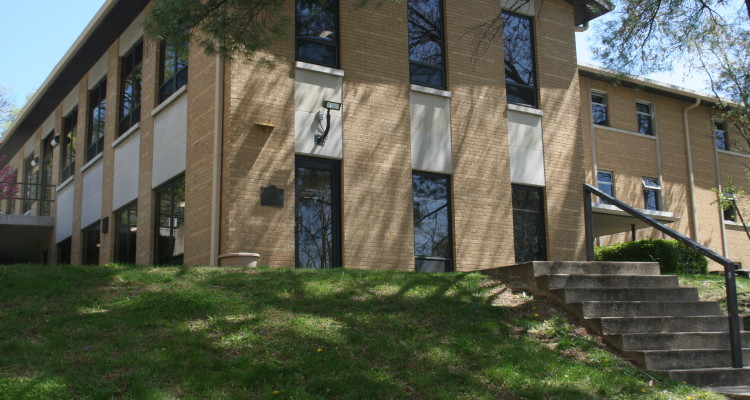By: Andrew Hampton, Staff Writer
It takes roughly 10 seconds for any visitor to realize that Bellarmine’s terrain is rather atypical for a college campus. Where most campuses have sprawling, flat plains of concrete that stretch over several miles, Bellarmine has a series of rolling hills condensed into a relatively small perimeter.
While some think that the romantic image of a university atop a hill adds to Bellarmine’s charm, it creates problems for students who have physical disabilities. Making the climb up a hill in a wheelchair or on crutches is no easy task, whether you’re an athlete with a temporary injury or a student with a long term illness.
It’s equally difficult to accommodate these needs. The medical team at Bellarmine has done its best to service those who need help, but it can only do so much to fight what is unchangeable. Ronda Purdy, Bellarmine’s director of disability services, said she believes that providing adequate accessibility features requires less of a focus on fighting the land and more of a focus on examining the individual needs of students.
“Bellarmine is small enough that we can provide a personal touch [in terms of accessibility], and I think that’s something we promote campus-wide,” Purdy stated. “My philosophy in this office is that I want to individually know the student. I do an individual needs assessment the first time I meet with each student… It’s about identifying what those individual needs are, and then identifying how their disability creates barriers for them in the learning environment.”
A major concern to disability services is the fact that the nurse’s station is one of the least accessible areas on campus for handicapped students. The entrance is only directly accessible from a flight of stairs on either side, meaning that a student with a disability that inhibits his or her ability to walk would find gaining access challenging. Purdy is well aware that this is a glaring issue for students and said she hopes that the nurse’s station will be able to find a more suitable location in Centro once construction is complete.
“Once Centro is finished, there will be a shift in all different areas, and the goal is to find a more accessible space [for the nurse’s station],” Purdy said. “In the meantime, the idea that we’ve come up with is to make house calls. If there is a student who, for whatever reason, cannot make it in to health services, they will contact Nurse Alice or a nurse practitioner, and then they will come to the student.”
Purdy said that students’ needs are not ignored and that the university is doing its best with the current resources until health services can move into a new space.
Alice Kimble, Bellarmine’s director of health services, said that she believes this university is better at providing accommodations to disabled students on an individual basis than other, larger universities.
“What I think this university is probably better about than most places is if you come to us and say that you have an issue, everybody will do everything they can to make sure that you are accommodated, in some way and somehow. Whether it’s security taking you somewhere, making sure that you have a room that is accessible, or that all of your classes are accessible.”
To a disabled student, perhaps the thing that matters most is that he or she feels that the University’s disability services office has have created an environment where he or she can feel that a disability does not hinder him or her academically.
Whitney Foster, a junior music major, said Bellarmine has given her the same academic opportunities despite of her disability. Foster was born with arthrogryposis multiplex congenita, a condition that causes joints in the arms to contract and be stiff, therefore severely limiting their range of motion and utility.
“I think Bellarmine does a really good job at providing different services for people with disabilities,” Foster said. “I think, being that it’s a smaller campus, it’s a lot better than it would be at a bigger university. … I have a note taker for all of my classes, where a student will be in class with me, and after class we’ll go over to the library and get a copy of their notes. I also take my tests in the Academic Learning Center because it takes me a little longer for me to write essays and fill out multiple choice stuff.”
As for things that disability services could improve upon, Foster listed one subtle but important inconvenience.
“Handicapped doors are not very good. I was on campus last week… and I went to press one of the doors, and the button wouldn’t work, and the door was locked. It makes it a little hard to do things, especially in the music department. In the music department, the handicapped doors never work,” she said.
Students with further questions can contact disability services at (502) 272-8490.

